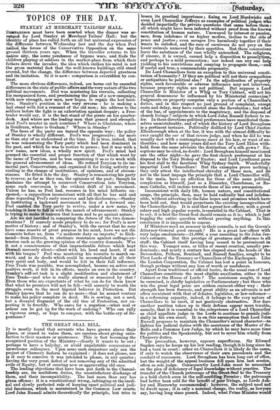TOPICS OF THE DAY.
STANLEY AT MED:HI-ANT TAILORS' HALL Coseeannson must have been warted when the dinner was ar- ranged for Lord Stanley at Merchant Tailors' Hall; but the identity of place has called forth an all but universal expression of the difference between Wednesday last and the day when Peel rallied the forces of the Conservative Opposition on the same ground thirteen years ago. When the traveller returns to his native city, the scene perchance of bygone wars, and finds the children playing at soldiers in the market-place from which their fathers drove the invader, the idea which strikes his mind is not the gross material fad that the well-known buildings still stand around, but the change, the difference between departed greatness and its imitation. So it is now : comparison is overridden by con- trast.
The more obvious differences' indeed, are borne out by essential differences in the state of public affairs and the very nature ofthe two political movements. Peel was mustering his recruits, collecting his reorganized force, and proclaiming the plan of a new campaign, with new strength, new men, new hopes, to regain the lost terri- tory. Stanley's position is the very reverse : he is making a last stand with but a remnant of the old men ; his address to the soldiers before the fight is an exhortation against despair; a Free- trader would say, it is the last stand of the pirate on his-quarter- deck. And where are the leading-men that graced and strength- ened Peel's muster in such numbers ? Where is Gladstone, where is Gonlburn, where is Graham Where is Stanley ?
Thee faces of the party are turned the opposite way; the policy
of Stanley is wholly different. Peel's was progressive; far more so than any of us understood at the time. It is true, indeed, that he was remnstering the Tory party which had been dominant in the past, and which he was to restore to power.; but it was with a new name new ideas, a._ wholly new spirit Peel's mind had grasped the essential and proper function of that which went by the name of Toryism, and he was organizing it so as to work with the general advancement of ideas. He refined Toryism to its im- mortal part, Conservatism, and organized it for living activity ac- cording to the change of institutions of opinions, and of oircum- stances. He fitted it. to the day. Stanley is remusterin,g his party to recover, as far as they can, the opinions of the past; though he disclaims the attempt to reconvert Conservatism into Toryism, some such conversion is the evident drift of his movement -Unless he has, as Peel had, recesses in his mind hitherto un- opened,—a supposition inconsistent with all that he has said and done regarding Peers early reserves and late diselosures,—Stanley instituting a backward movement in lien of a forward one. Peel enabled the Tory party to revive, under a new name by teaching it how to fall in with the march of advancement: Stanley is trying to make it unlearn that lesson and_ to go against nature.
• Are we not justified in comparing the future of the two demon- strations? It scarcely needs prophecy to do so ; for Peel's is now matter of history ; and of Stanley's, with the caveat that he may have some reserve of great purpose in his mind, have we not the elements before us, from "a moderate duty on imports," to Rich- mond—from Disraeli, to obstinate resistance against suffrage-ex- tension such as the growing opinion of the country demands. Was it not a consciousness of that impracticable future which kept Disraeli morosely silent—silent with his head and heart, if not with his tongue ? Peel was mustering his recruits to march on- ward, and to do deeds which could be accomplished in all their very spirit and body, and would be felt in their full influence. Free Trade was possible, was accomplished, became an active and positive work, is felt in its effects, marks an sera in the country. Stanley's. self-set task is a slight modification and abatement of
Free —and who is really alarmed or reassured by that ? Even those who are expeetants of what he can do for them know that what he promises will not be felt—will scarcely be worth the struggle even to the most bigoted believer in Protection. But Stanley knows that he can do no more—that he oannot venture to make his policy complete in deed. He is sowing; not a seed, but a decayed fragment of the old tree of Proteetion, not ex- pecting it to fructify. Who cares for a negation—what zeal or ardour can be got up for-the work of undoing-? Who can rally a vigorous army, or hope to conquer, with the battle-cry of Re- pentanoe ?






























 Previous page
Previous page